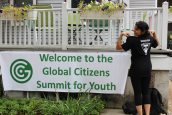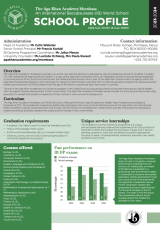Global Citizens Summit for Youth at Harvard University
 The holidays provide an opportunity for students to expand and share their knowledge, along with learning more about themselves as citizens of the world.
The holidays provide an opportunity for students to expand and share their knowledge, along with learning more about themselves as citizens of the world.
During the holiday, I had the opportunity to represent the Aga Khan Academy, Mombasa, and Kenya as a scholarship student at the inaugural Global Citizens Summit for Youth, held at Harvard University, in Cambridge, Massachusetts.
Organized by the founder of Global Citizens Initiative, Yumi M Kuwana, the summit is aimed at engaging young global leaders to make an impact in their communities, and eventually broaden their horizons and include the rest of the world. For the inaugural year, the theme of the conference was centered on Fairness and Freedom. The summit united 24 students of different nationalities, with five international scholarship students, 3 faculty members from Phillips Exeter Academy, multiple teaching assistants, and keynote speakers from the Harvard Graduate School of Education.
Throughout the summit, we had the opportunity to stay in the heart of Cambridge, at Irving House, amidst the bustling daily university life, from where we would attend daily classes at the Harvard Faculty Club, and have group meetings and fellowship events around Harvard Square. Life was very different for the duration that I stayed at the house, as I was responsible for myself and all my belongings, detached from my comfort zone, and away from family. The experience was in line with university life, and a great way to prepare me for my final year at the Academy, and eventually university.
Shaped like a normal school day, we were required to attend classes from 8h30, until lunch time, after which we were given the chance to work on ‘Glocal’* projects in groups. Each day had a different theme, ranging from ethics, engagement and leadership, among many others. All discussions, texts and keynote speeches were associated with the main focus of the day. Our sessions would usually commence with an inspiring keynote speech by one of the faculty, spanning great leaders such as Abraham Lincoln to engagement and service activities, such as those in the Ballytobin Community, Ireland. The morning keynotes would set the pace for the day, and inspire me to make a difference, and provide insightful opinions throughout the sessions.
 The lessons were shaped differently from conventional classes, using the Harkness method, which allows for students to engage in meaningful discussions with each other, as opposed to a ‘lecture’ set up, where the teacher leads discussions. The Harkness method is similar to the learning style adopted at the Academy, where students usually sit in groups of 4 or larger, and discuss questions and ideas, with the teacher supervising and ensuring all students are on task. Coming from an IB school, the Harkness method was tailored to my needs, and I was able to share my ideas confidently, and appreciate others’ opinions. In many ways, including my ability to uphold conversations in and out of the classroom, I learnt to appreciate my surrounding environment, my family values, and the quality of education I have received since nursery school. The summit and learning about other students, allowed me to empathize with students who had difficulties in their upbringing, but also taught me to be grateful for the amenities I have had access to throughout my educational career.
The lessons were shaped differently from conventional classes, using the Harkness method, which allows for students to engage in meaningful discussions with each other, as opposed to a ‘lecture’ set up, where the teacher leads discussions. The Harkness method is similar to the learning style adopted at the Academy, where students usually sit in groups of 4 or larger, and discuss questions and ideas, with the teacher supervising and ensuring all students are on task. Coming from an IB school, the Harkness method was tailored to my needs, and I was able to share my ideas confidently, and appreciate others’ opinions. In many ways, including my ability to uphold conversations in and out of the classroom, I learnt to appreciate my surrounding environment, my family values, and the quality of education I have received since nursery school. The summit and learning about other students, allowed me to empathize with students who had difficulties in their upbringing, but also taught me to be grateful for the amenities I have had access to throughout my educational career.
In the afternoon, we would work on our ‘Glocal’ projects providing us with a more practical, ‘hands-on’ experience to making a small difference in the world. Each group had a theme based on a currently pressing matter in the world, such as water, deforestation, nuclear disarmament, and many other global issues. During our planning sessions, we would have the chance to discuss potential solutions to the problem and on the last day, present our findings and attempt to make the movement global through the other citizens. My project was based on water, and involved expanding my Middle Years Programme personal project, which was the creation of a cost effective water purifier, made from traditional elements. The presentations on the last day, provided me with the opportunity of networking and sharing my interests, and involving other students and teachers from the around the world in joining the movement.
For the rest of the day, we had the opportunity of carrying out team building activities and getting to know each other better, before attending our evening keynote sessions led by Harvard graduates and professors. One of the most striking keynote speeches was by Prof. Bruno della Chiesa, who discussed the idea of multilingualism and neuromyths. He also raised an interesting notion referred to as ‘doxa’, which suggests that an individual cannot understand their country or value system, until they are able to step out of their ‘box’ and perceive society with an objective view. Through this innovative perspective, I was able to consider the conservative communities we live in and question some beliefs and values which shape us as individuals, and in fact refute them, devising ideas with a more holistic perspective. Prof. Linda Hill, another keynote speaker in the evening, reflected our school’s mission statement in that she discussed the idea of collective leadership, and suggested the idea that true leaders lead from behind. I was truly mesmerized by her fresh insight into the matter, as I had the chance to reflect upon my past actions as a leader, and place them in perspective for the future. The evening talks were highly educational, not to forget the delicious cuisines (Japanese, Indian, Thai, Kosher, American, and Mexican), spanning different continents that we were exposed to for dinner every night!
Overall, as one of the four scholars from Africa, and the only Kenyan, not only was I exposed to different cultures and belief systems, but also I was able to place myself in a pluralistic global environment, and understand my true purpose as a global citizen. Interactions were made easier, because of the constant exposure we are provided with as students at the Academy, as per His Highness the Aga Khan’s vision. Overall, the summit has motivated me to unite with students to make a difference in areas I am truly passionate about and make the world a better place. Most importantly, GCSY provided a platform for me to understand the world using a different perspective along with understanding myself and my true identity. It was truly an enriching experience, and one that I will never forget.
* Glocal is a combination of the word global and local, and is geared towards dealing with global situations (such as the water crises) in a local manner, before expanding the solution to the rest of the world.
By Karishma Bhagani, DP2 Student, AKA, Mombasa.





